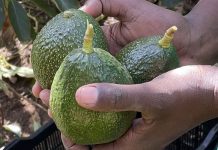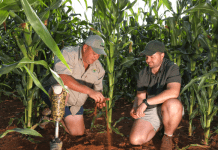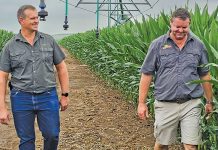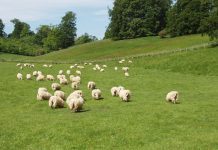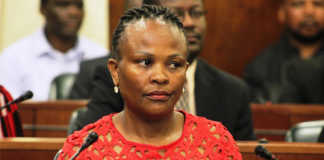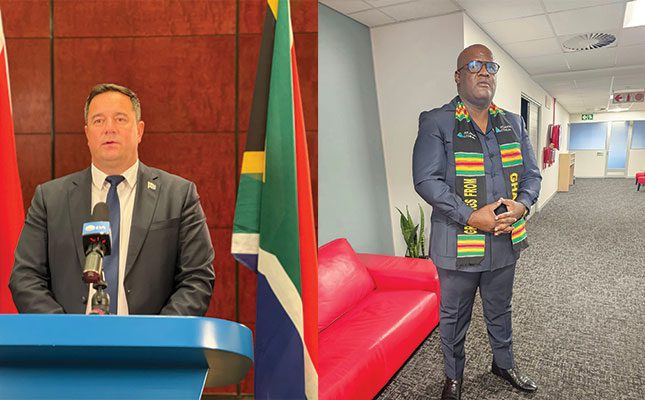
Photo: X
In announcing his cabinet on Sunday, President Cyril Ramaphosa appointed John Steenhuisen, leader of the DA, as the new minister of agriculture. PAC leader Mzwanele Nyhontso will be the minister of land reform and rural development.
The ANC’s Rosemary Capa will serve as the deputy minister of agriculture, while former Limpopo premier Stanley Mathabatha has been appointed as the deputy minister of land reform and rural development.
WATCH John Steenhuisen at Nampo 2024
Other notable positions went to Enoch Godongwana as finance minister and Gwede Mantashe as mineral and petroleum resources minister, while Ronald Lamola was appointed minister of international relations and cooperation.
Wandile Sihlobo, chief economist at Agbiz, said: “The ANC, DA and IFP leaders are closely aligned on agriculture, with all three sharing in the ideas within the National Development Plan, the Agriculture and Agro-processing Master Plan (AAMP), and various government-led initiatives such as the Blended Finance instrument.”
The adopted National Development Plan’s aim is to grow an inclusive and competitive agricultural economy. Sihlobo said that thus far the implementation of the plans had been scant, and that the focus of the new administration should now be to fully execute its objectives.
Sihlobo however expressed concern over the IFP’s ambiguity on land policy. The IFP had stated in its manifesto that it would “continue to support the policy of land expropriation with reasonable compensation”.
He said this should not be a huge area of contention as the parties in the GNU worked to find a unified policy agenda for the seventh democratic administration. He again pointed to the AAMP, which called for the release of about 2,5 million hectares of land within the State Land Holding Account, which would greatly assist land reform.
The National Livestock Farmers’ Association of South Africa (NALFA), African Farmers’ Association of South Africa (AFASA), AgriSA, and the Southern African Agri Initiative (SAAI) all welcomed the new appointments.
Agri SA and the Southern African Agri Initiative (SAAI) also expressed satisfaction with the new appointments. Agri SA said that they were confident that under these ministers’ leadership, the agriculture sector would thrive and continue to be a cornerstone of the national economy.
Johann Kotzé, Agri SA CEO, said the organisation’s aim would be to support the ministers in three critical areas: food security for all South Africans, an enabling environment in which agriculture would be a competitive global player and thereby ensured the sector remained a key contributor to the economy, and sustainable agriculture that preserved the environment.
Kotzé expressed his gratitude to the outgoing minister of agriculture, land reform and rural development, Thoko Didiza, for her continued support and understanding of the agriculture sector.
Molefe Mahape, chairperson of AFASA, stated that Steenhuisen’s primary focus should be on creating a conducive environment for commercial farmers to prosper, while ensuring emerging farmers receive more support from knowledgeable and visible extension officers.
However, Mahape believed that rural development should have remained within the agricultural portfolio. This, he argued, would allow the two entities to work cohesively in enacting policies that benefit the agricultural community.
Nakana Masoka, deputy chairperson of the National Livestock Farmers’ Association of South Africa (NALFA), hoped for a productive working relationship with Steenhuisen to speed up the commercialisation of small-scale black livestock farmers.
“We need a structured government support programme that can elevate these farmers to the next level, rather than been given a piece here and a piece there. Each province must have its own plan, and farmers assisted equitably, based on their actual needs, not those perceived to be important by politicians.”
Regarding youth development, Ipeleng Kwadi Seboni, national convenor for Youth in Agriculture and Rural Development in South Africa, emphasised the importance of focusing on the NDP to facilitate productive youth participation in agriculture.
“Youth in rural communities must be put at the centre of development with progressive policies and programmes in place that will assist them to utilise land, eco-tourism, crafts and cultural diversity to develop their own communities.”
She also expressed hope that Nyhontso would continue and improve transformation policies in line with the PAC’s vision of providing land for African people.
“It is crucial that Nyhontso implements programmes that are meaningful and that will bring sustainable development to rural communities to allow for the productive use of land.”
SAAI said in a statement that building relationships with the new ministers would be crucial to ensure constructive and open dialogue to solve issues like collapsing animal health and infrastructure.
Sihlobo concluded that regardless of the role players in the positions, the policies needed to be maintained.
“We know what needs to be done to make agriculture thrive and make a success of land reform. It’s all in the AAMP and this should remain the focus of any incumbent.”
Be part of the conversation. Let us know your thoughts on the new ministers.


